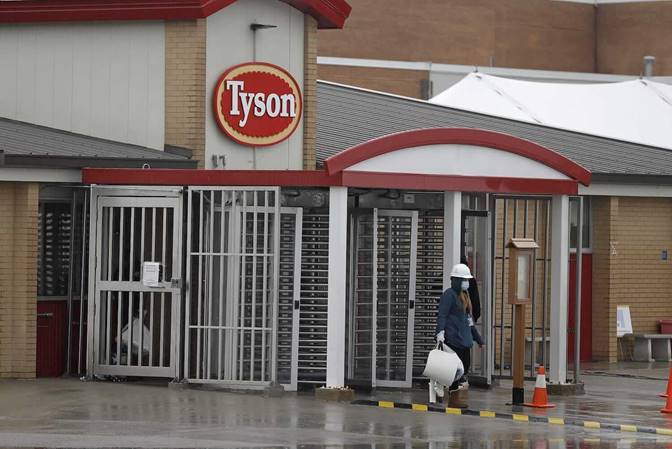The Counter: Developing: Trump will order meat plants to remain open, citing Defense Production Act
Developing: Trump will order meat plants to remain open, citing Defense Production Act
04.28.2020, 3:15pm
The announcement follows a high-profile plea from the chairman of Tyson Foods, one of the country’s largest meatpackers.
Updated 3:26 PM EST. This is a developing story.
Above: A Tyson Foods plant in Logansport, Indiana, which remains closed after 146 workers tested positive for Covid-19.
President Trump plans to use the Defense Production Act to order meatpacking plants to remain open, declaring them critical infrastructure during the Covid-19 pandemic, a person familiar with the matter confirmed to The Counter on Tuesday.
The government will provide additional protective gear for employees as well as guidance, according to the person. The president is expected to sign this order as early as today.
This follows a high-profile, full-page ad that appeared Sunday in the New York Times, Washington Post, and Arkansas Democrat-Gazette, in which John H. Tyson, chairman of Tyson Foods, warned that “the food supply chain is breaking” and pleaded with the U.S. government to intervene. “The government bodies at the national, state, county and city levels must unite in a comprehensive, thoughtful and productive way to allow our team members to work in safety without fear, panic or worry,” he wrote.
A twitter thread by The Counter, which provided additional context and analysis, was retweeted by the president on Tuesday morning.
As we’ve reported in recent weeks, America’s food supply chain is experiencing unprecendented disruptions in the wake of Covid-19, and the meat industry’s struggle have been especially notable. According to The Counter’s tracker of slaughterhouse closures, 21 major meat plants have been closed due to the pandemic. Some have since reopened. The situation continues to be fluid, as facilities address ongoing illnesses among their workers and administer safety and cleaning protocols in response.
Tyson Foods is one of four global meatpackers—along with JBS, Cargill, and Marfrig, collectively known as the Big Four—that dominate as much as 80 percent of the American meat supply chain. That’s a hefty market share: In 2019, U.S. meat sales topped $50.05 billion.
News of the the president’s imminent order—and the suggestion that plants could be required to remain open—already appears to be generating ire among groups that advocate for worker protections.
“We only wish that this administration cared as much about the lives of working people as it does about meat, pork and poultry products,” said Stuart Appelbaum, president of the Retail, Wholesale and Department Store Union (RWDSU), in an emailed statement. “When poultry plants shut down, it’s for deep cleaning and to save workers’ lives. If the administration had developed meaningful safety requirements early on as they should have and still must do, this would not even have become an issue. Employers and government must do better. If they want to keep the meat and poultry supply chain healthy, they need to make sure that workers are safe and healthy.”
On Sunday, the Occupational Safety and Health Administration (OSHA)—the federal agency responsible for worker safety—issued guidelines for meatpacking plants alongside the Centers for Disease Control and Prevention (CDC), the Washington Post reports. The guidelines are not mandatory. The agency also announced earlier this month that it will not enforce its record-keeping requirements for work-related illnesses until further notice.
Tyson had not responded to a request for comment by press time. This post will be updated as this story develops.
Additional reporting contributed by H. Claire Brown and Jessica Fu.
